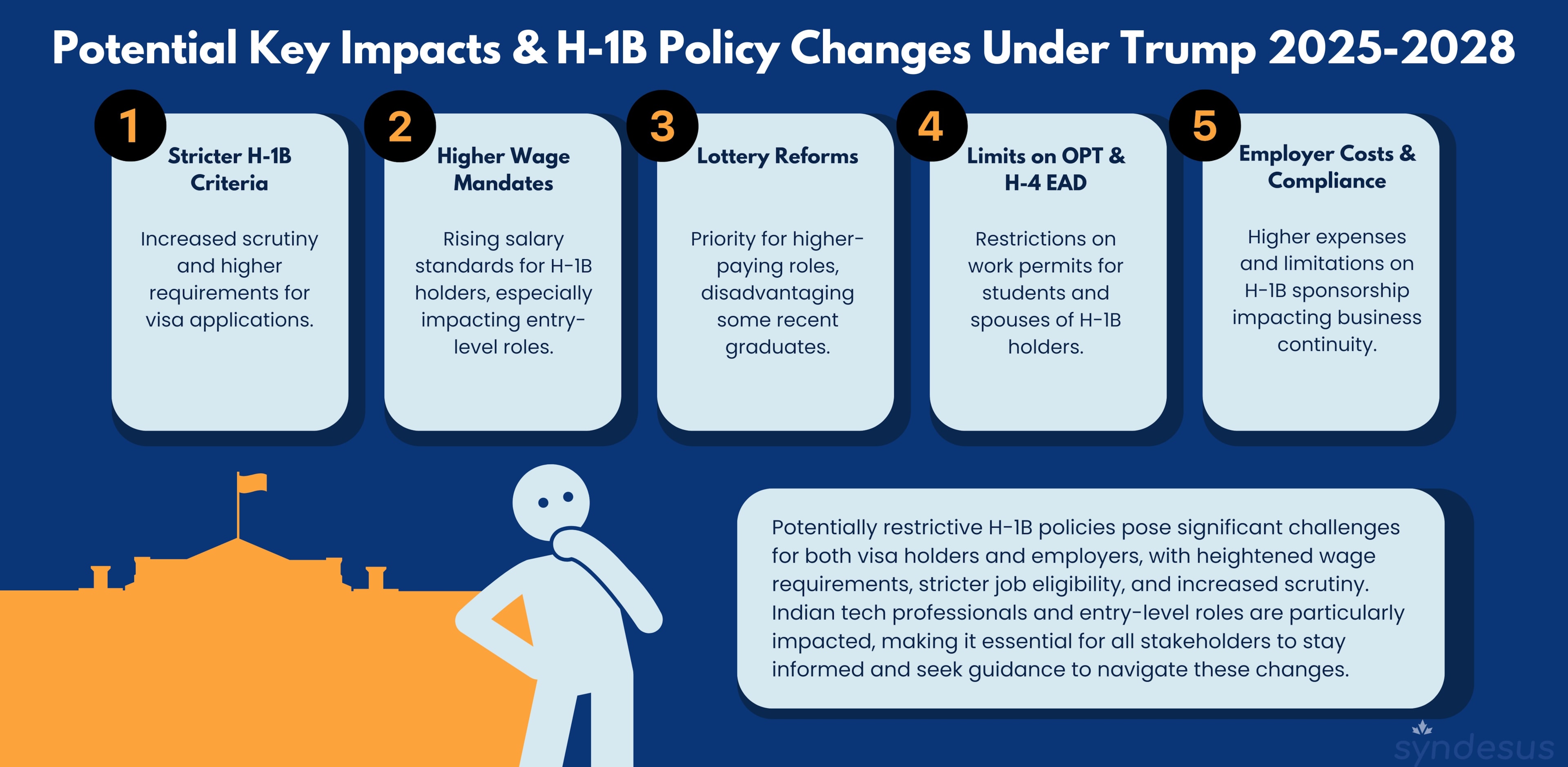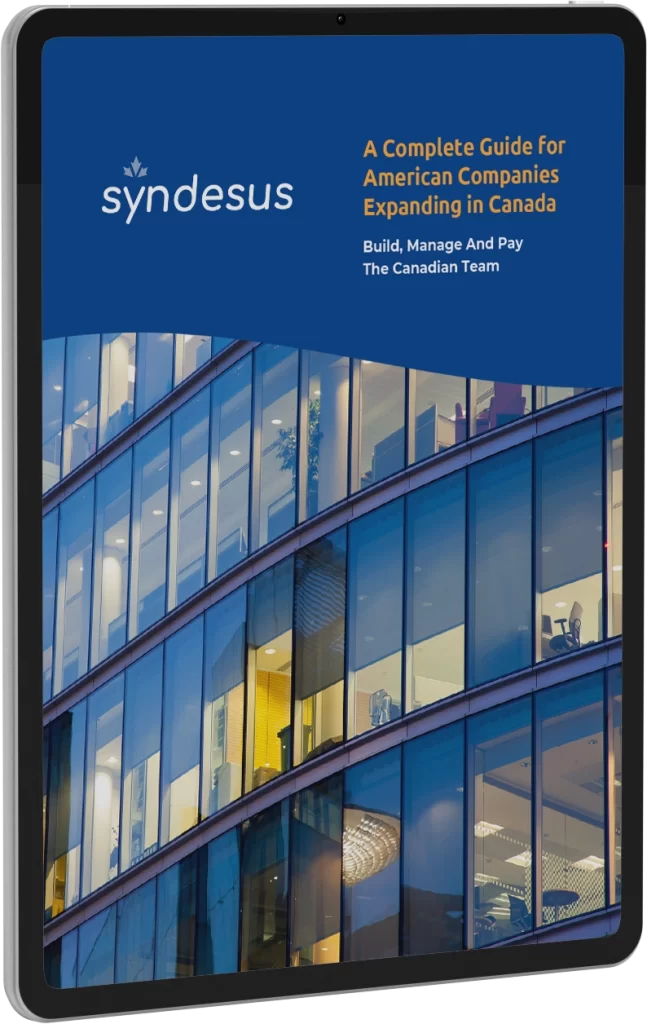In 2017, during the first Trump administration’s thinking on immigration, the “Buy American, Hire American” executive order led to significant changes affecting employment-based immigration programs, particularly the H-1B visa system. The policies Trump’s administration pursued aimed at restricting these programs, reflecting the executive order’s influence. As the 2024 election night results placed Trump as the Republican presidential nominee and re-elected as the 47th U.S. president, many legal, highly skilled immigrants in the U.S. are wondering what’s next for H-1B visa holders under Trump. This blog compares the Trump administration’s H-1B policies from 2017-2020 with what we might expect from 2025 to 2028. If you’re a current H-1B holder, a student on OPT, or an employer of skilled immigrants, read on to see how the new administration’s agenda might impact your job, visa status, and options.

Background: The H-1B Visa Program and Trump’s First Term (2017-2020)
During his first term, President Trump’s administration’s agenda focused heavily on immigration policy, with the “Buy American, Hire American” executive order and the policies Trump’s administration pursued, implementing a series of regulations aimed at restricting the H-1B visa program. Towards the end of its term, the Trump administration issued specific regulations that placed further restrictions on the H-1B visa program. Key impacts included:
- Higher Standards for H-1B Applications: The Trump administration raised requirements for companies seeking H-1B visas, requiring business continuity for applicants and imposing higher scrutiny on job roles, qualifications, and minimum salaries. This led to more denials and Requests for Evidence (RFEs).
- Restricted Pathways for Certain Professions: Roles deemed not specialized enough, such as computer programming, faced greater scrutiny and fewer approvals, creating hurdles for Indian professionals and others in tech fields.
- Increased Wage Requirements: Wage adjustments aimed to protect American workers, creating stricter guidelines for minimum salaries.
- Limitations on OPT and H-4 Visas: Changes to the OPT program and H-4 EAD created challenges for H-1B holders’ families, particularly impacting Indian nationals and other skilled immigrants.
Comparison to Biden Administration’s H-1B Visa Policies
The Biden administration has taken a more supportive stance on H-1B visas compared to Trump’s restrictive approach. While Trump sought to limit H-1B use by raising minimum wage requirements and narrowing the definition of “specialty occupation” to protect American jobs, the policies Trump’s administration pursued also included the ‘Buy American and Hire American’ executive order, which aimed to restrict employment-based immigration programs. Biden has delayed these changes, focusing instead on improving program efficiency without imposing high costs on employers. Biden’s policies aimed to balance the demand for skilled talent with job protection, promoting economic growth and innovation rather than limiting visa issuance. This changing approach may cause H-1B visa holders to be disconcerted and worried about their futures.
What H-1B Holders Can Expect in 2025-2028 Under Trump
If a second Trump term continues its immigration policy focus, H-1B visa holders and employers may face stricter regulations in several areas. The policies Trump’s administration pursued, such as the ‘Buy American and Hire American’ executive order, aimed to restrict employment-based immigration programs, particularly H-1B visa regulations.
1) Stricter H-1B Criteria
Policies Trump’s administration pursued, such as the ‘Buy American and Hire American’ executive order, led to increased scrutiny and RFEs on applications, and these policies are likely to continue into a potential second Trump term. This could impact early-career professionals, particularly in entry-level tech roles, and affect business continuity planning for employers.
2) Higher Wage Requirements
One priority may be increasing minimum salaries to ensure parity with U.S. counterparts, which could impact Indian professionals and other skilled immigrants by making it costlier for companies to hire international talent. The policies Trump’s administration pursued, such as the ‘Buy American and Hire American’ executive order, aimed to restrict employment-based immigration programs, particularly in relation to H-1B visa regulations.
3) Reform of the H-1B Lottery System
The policies Trump’s administration pursued have long made the H-1B lottery system a point of discussion. Trump may implement changes, potentially prioritizing workers in higher-paying jobs or those with advanced degrees. This would favor certain sectors and roles over others, potentially disadvantaging recent graduates or applicants with bachelor’s degrees.
4) OPT and F-1 Visa Implications for International Students
The policies Trump’s administration pursued could lead to stricter controls on OPT, reducing transition opportunities from OPT to H-1B and creating challenges for Indian nationals pursuing tech roles.
5) Potential Changes to H-4 EAD
Many spouses of H-1B holders work in the U.S. under the H-4 EAD. Among the policies Trump’s administration pursued were efforts to end the H-4 EAD, although they were not fully implemented. In a second term, H-4 EAD elimination could be revisited, impacting dual-income families.

Impact on H-1B Holders’ Ability to Work and Live in the US
The Trump administration’s policies and regulations aimed at restricting the use of the H-1B program may significantly impact H-1B holders’ ability to work and live in the US. As a result of the Trump administration’s thinking, H-1B holders may face increased scrutiny and difficulty in obtaining and maintaining their visas.
Increased Scrutiny and Challenges for H-1B Visa Holders
One of the key concerns for H-1B holders is the Trump administration’s proposal to increase the minimum wage requirements for H-1B visa holders. This could make it more difficult for employers to sponsor H-1B visas, particularly for entry-level positions. Additionally, the Trump administration’s regulations aimed at narrowing the definition of “specialty occupation” may limit the types of jobs that are eligible for H-1B visas.
Effects on Indian Tech Professionals
Indian tech professionals, who make up a significant portion of H-1B visa holders, may be particularly affected by these changes. The Trump administration’s policies may make it more difficult for Indian tech professionals to obtain H-1B visas, which could impact their ability to work and live in the US.
Challenges for Employers Relying on H-1B Talent
Employers who rely on H-1B visa holders may also face challenges in protecting business continuity. The Trump administration’s regulations may require employers to pay higher wages to H-1B visa holders, which could increase costs and make it more difficult to sponsor visas. Additionally, the Trump administration’s policies may limit the ability of employers to sponsor H-1B visas for certain types of jobs, which could impact their ability to attract and retain top talent.
Preparing for Continued Changes
In light of the current campaign platform of the Republican presidential nominee, it is likely that the Trump administration will continue to pursue policies aimed at restricting the use of the H-1B program. As a result, H-1B holders and employers should be prepared for potential changes to the program and should take steps to protect their interests.
Employer Preparation for H-1B Program Changes
Employers who rely on the H-1B program to hire foreign workers should be prepared for potential changes under a second Trump administration, particularly considering the policies Trump’s administration pursued to restrict employment-based immigration programs. Here are some proactive steps to ensure readiness:
- Review Current H-1B Petitions and Applications: Ensure that all current petitions and applications are fully compliant with existing regulations. This can help avoid any issues if new rules are implemented.
- File H-1B Petitions Early: Consider filing H-1B petitions and applications as soon as possible. Early filing can help mitigate the impact of any sudden changes or restrictions that the Trump administration might introduce.
- Develop a Contingency Plan: Prepare for potential changes by identifying alternative visa options or exploring other hiring strategies. This could include looking into cap-exempt H-1Bs or other visa categories that might be less affected by new regulations.
- Stay Informed: Keep up-to-date with the latest developments and changes to the H-1B program. Being informed will allow you to adapt quickly to any new rules or regulations that may be implemented.
- Consult with Immigration Counsel: Work with experienced immigration counsel to ensure that your company is prepared for any potential changes. Legal experts can provide valuable guidance and help navigate the complexities of immigration policy.
By taking these steps, employers can help protect their business continuity and ensure they are prepared for any potential changes to the H-1B program under a second Trump administration.
Impact on Legal Immigration and Green Card Aspirations
A second Trump administration, considering the policies Trump’s administration pursued, could have significant implications for legal immigration and green card aspirations. Here are some potential impacts to consider:
- Increased Scrutiny of H-1B Visa Applications: The Trump administration has already implemented policies aimed at restricting the use of the H-1B program. A second term could see even more stringent requirements and increased scrutiny of applications, making it more challenging for applicants to secure visas.
- Changes to the Green Card Process: The Trump administration has proposed changes to the green card process, including a points-based system that would prioritize skilled workers. If implemented, these changes could impact the ability of certain individuals to obtain green cards, particularly those without advanced degrees or specialized skills.
- Increased Focus on Merit-Based Immigration: Emphasizing merit-based immigration, the Trump administration could further prioritize applicants with high levels of education and specialized skills. This shift could make it more difficult for individuals without these qualifications to obtain green cards.
- Potential Changes to the EB-5 Program: The EB-5 program, which provides a fast track to green cards for investors, could see changes under a second Trump administration. These changes might make it more difficult for investors to qualify, potentially reducing the number of green cards issued through this program.
- Increased Uncertainty for Indian Tech Professionals: Indian tech professionals, a significant demographic in the U.S., could face increased uncertainty. The Trump administration has already implemented policies aimed at restricting the H-1B program, and a second term could bring even more stringent requirements and scrutiny, impacting their ability to work and live in the U.S.
Overall, a second Trump administration could have significant implications for legal immigration and green card aspirations, particularly for Indian tech professionals and other skilled workers. It is crucial for those affected to stay informed and consider alternative pathways to secure their future in the U.S.
Your Questions Answered: Impacts of Trump’s Immigration Policy
How Could These Changes Affect My Job With a U.S. Employer?
If you’re on an H-1B visa, anticipate that the policies Trump’s administration pursued, such as the ‘Buy American and Hire American’ executive order, may lead to additional costs for employers, potentially impacting roles and wages. Those working in high-demand fields (e.g., AI and cybersecurity) may find their positions more secure.
Will the H-1B Program See Major Changes?
The policies Trump’s administration pursued may include reforms around higher salary benchmarks, lottery prioritization, and restricted OPT-to-H-1B pathways.
What Does This Mean for International Students with Expiring OPT?
OPT holders, especially skilled professionals, might explore alternatives like the O-1 visa, which caters to individuals with extraordinary abilities, due to the policies Trump’s administration pursued to restrict employment-based immigration programs.
Backup Options for H-1B Holders and Indian Tech Professionals
As uncertainties in H-1B immigration policy grow due to the policies Trump’s administration pursued, exploring options like cap-exempt H-1Bs, alternative visas, or relocation to Canada are increasingly popular for Indian nationals and other skilled workers. Canada’s work permit options, like the Global Talent Stream, offer an attractive path for those looking for stable employment-based immigration.
Is Moving to Canada Really an Option?
With the evolving landscape in U.S. immigration policy, particularly the policies Trump’s administration pursued to restrict employment-based immigration programs, many Indian professionals and other skilled workers are considering Canada. Canada’s Express Entry program, Global Talent Stream, and friendly immigration counsel make it an appealing option, especially as U.S. immigration policies shift.
How Syndesus Can Help
Navigating the complexities of U.S. immigration policy, particularly in times of shifting political landscapes and the policies Trump’s administration pursued, can be challenging. Syndesus specializes in providing support and solutions for skilled workers and U.S.-based employers seeking to maintain business continuity in a competitive global market.
Whether you’re an H-1B holder, an international student, or a company looking to keep employees, Syndesus offers expertise and strategic guidance. We provide immigration counsel tailored to your needs, assisting skilled professionals in exploring alternative visa options and even relocation opportunities in Canada. For employers, we offer solutions to hire and retain international talent with greater flexibility, including pathways to retain skilled workers through Canadian employment options while continuing to serve U.S.-based clients.
If you’re interested in understanding how Syndesus can help you or your business navigate these immigration changes, reach out for more information. Our experienced team is here to support your goals, from exploring cap-exempt visas and alternative pathways to securing your future in North America.
The content and materials available via Syndesus are for informational purposes only and do not constitute legal advice.
